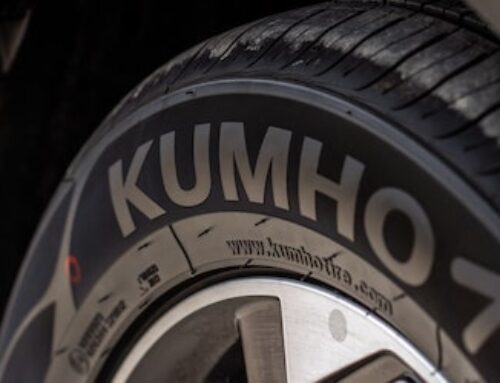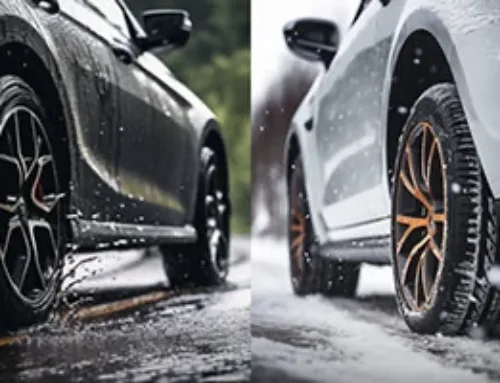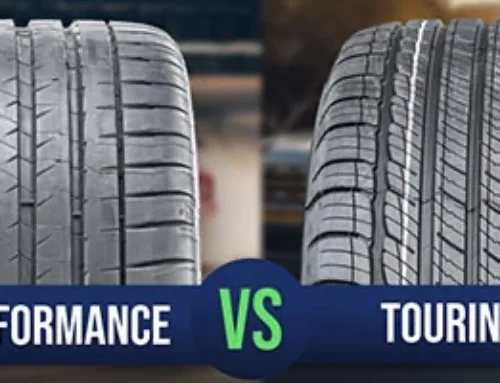Table of Contents
We all know how important it is to have good tires on your car, but with so many different types, it can be difficult to know which tires are right for you. Every driver and vehicle is unique, and so are your driving needs. Two of the most popular types of tires are all-season and summer tires, and choosing between them can be really tricky. We break down the pros and cons of summer tires vs. all-season, so you can choose the ones that give you the best balance of value, performance, and safety.
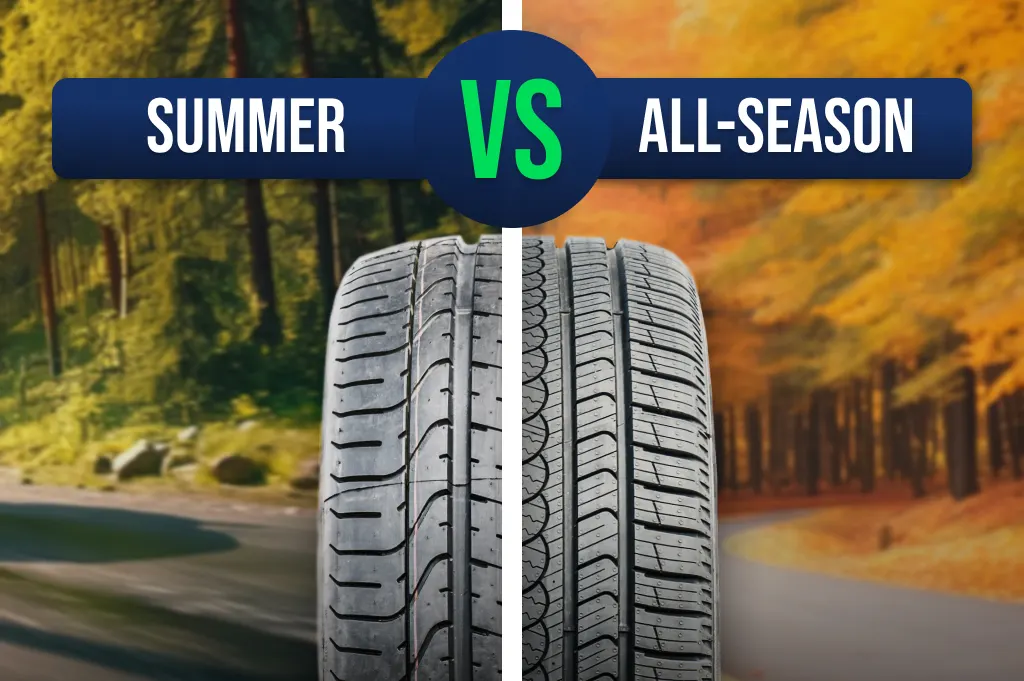
All-season tires—the basics
All-season tires are a great choice for the average driver. They are built to give you reliable performance in a wide variety of weather conditions, including wet, dry, and light snow. They’re made from a softer rubber compound than summer tires, which allows them to provide better traction in colder temperatures.
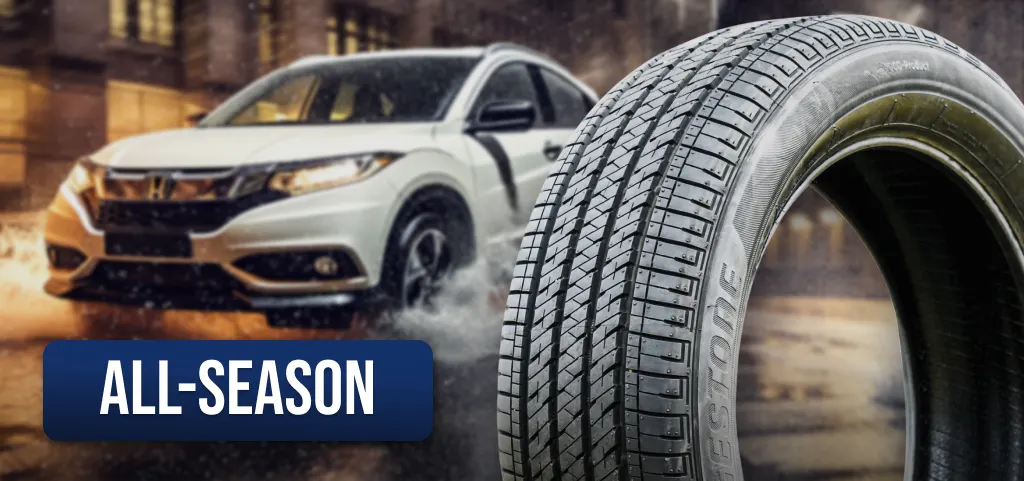
The main defining characteristics of all-season tires are:
- Good performance in both wet and dry conditions
- Moderate tread depth for a wide range of weather conditions
- Longer tread life to save you money
- Softer rubber compounds for better performance in colder temperatures
- Available in many sizes and weight capacities for a wide range of vehicles
- Work best with a temperature range from 14°F up to 100°F
Benefits of using all-season tires
All-season tires are great for the majority of drivers for a wide range of reasons.
As they offer reliable performance in a variety of weather conditions, unless you live somewhere with extreme weather, you can keep them on your car year round. This saves you time, money, and storage by not having to have two sets of tires.
These tires also offer excellent handling on wet roads and are far safer on snow than summer tires. All-season tires are also designed for a comfortable and quiet ride on the roads and highways.
When to use all-season tires
All-season tires are designed for use year-round in temperate climates. They’re best suited to areas with moderate climates that don’t experience extreme temperatures or heavy snowfall. If you live somewhere that gets really harsh winters or extremely hot summers, you may want to consider using dedicated winter or summer tires. However, all-season tires can cope well with light snow as well as hot weather.
Top all-season tire models
Here are some of our picks for the best all-season tires on the market today:
Michelin CrossClimate 2
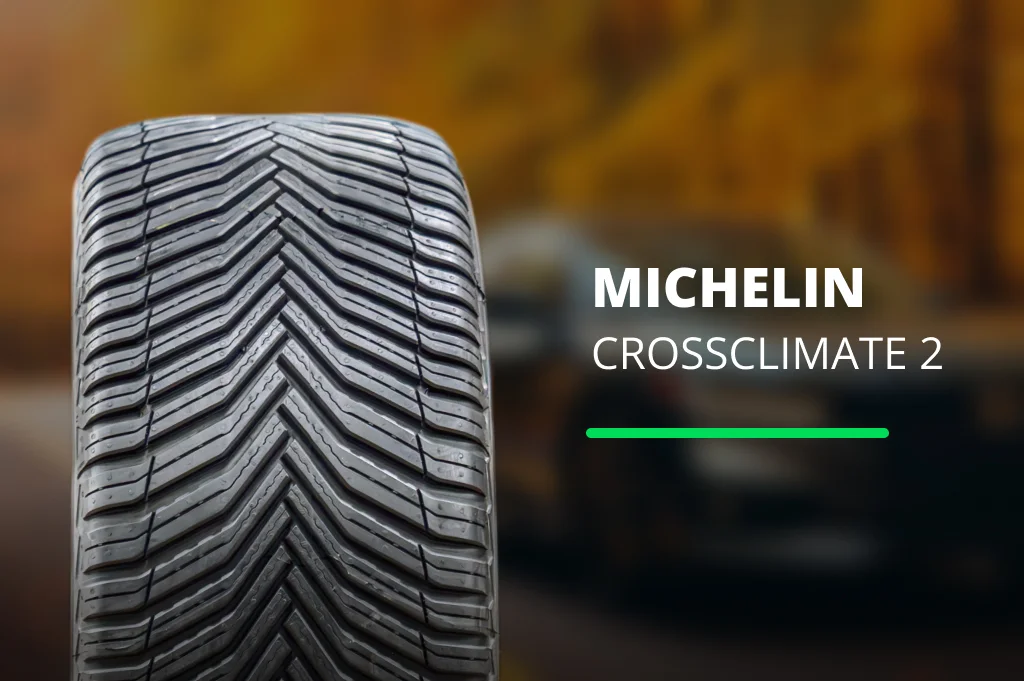
The Michelin CrossClimate 2 tire is a great all-around choice for an all-season tire that offers exceptional handling and reliability. This tire is designed to provide superior traction and handling in both wet and dry conditions. It also has the three peaks symbol, giving it superior winter driving capabilities compared to many other all-season tires, making it a versatile option for year-round driving. Additionally, the CrossClimate 2 delivers a comfortable and quiet ride thanks to its optimized tread design.
Goodyear Assurance WeatherReady
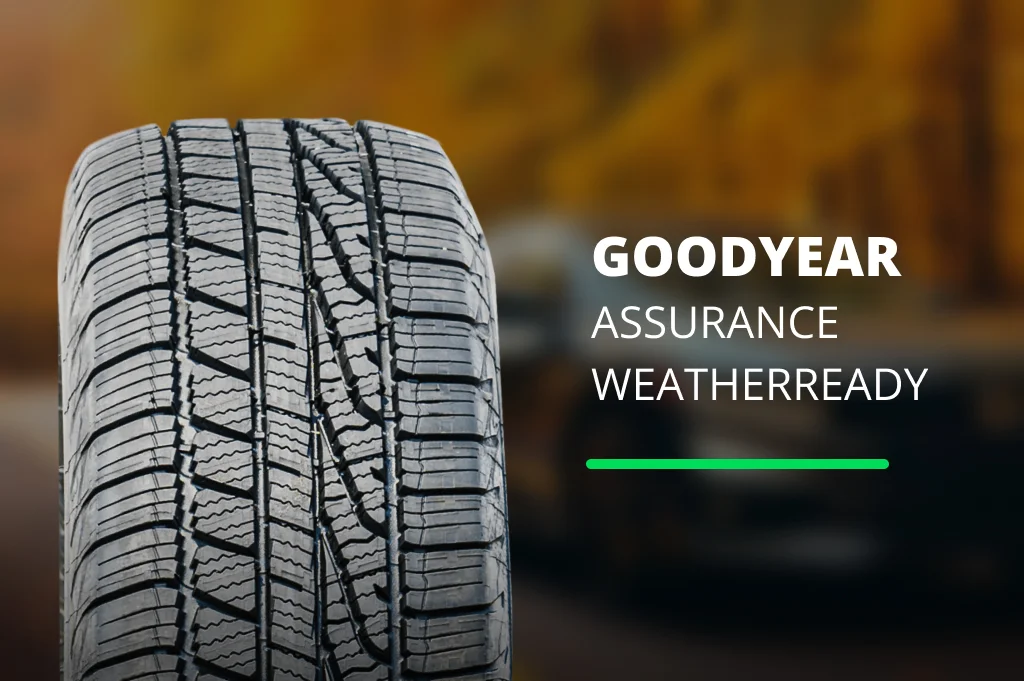
The Goodyear Assurance WeatherReady tire offers exceptional winter performance and reliability compared to many other options on the market. This tire is designed to provide superior traction and handling in a variety of weather conditions, thanks to its innovative Weather Reactive technology. When compared to other all-season tires, the Goodyear Assurance WeatherReady stands out for its exceptional handling and braking performance in wet and dry conditions, as well as its excellent snow traction. It comes with a 60,000-mile tread life warranty.
Bridgestone Turanza QuietTrack

The Bridgestone Turanza QuietTrack tire is a top-performing all-season tire that delivers superior comfort and handling compared to many other options on the market. This tire is designed to reduce road noise and vibrations for a smooth and peaceful driving experience. It also features an advanced tread pattern and rubber compound that delivers exceptional traction and handling in both wet and dry conditions. It’s not top-of-class for winter driving compared to other options, but it does have great tread life with an 80,000-mile tread life warranty.
Summer tires
Summer tires are designed for warm weather conditions and offer superior performance in handling, braking, and cornering, making them the tire of choice for performance car enthusiasts. As a result, you might also hear them referred to as ultra-high-performance tires (UHP).
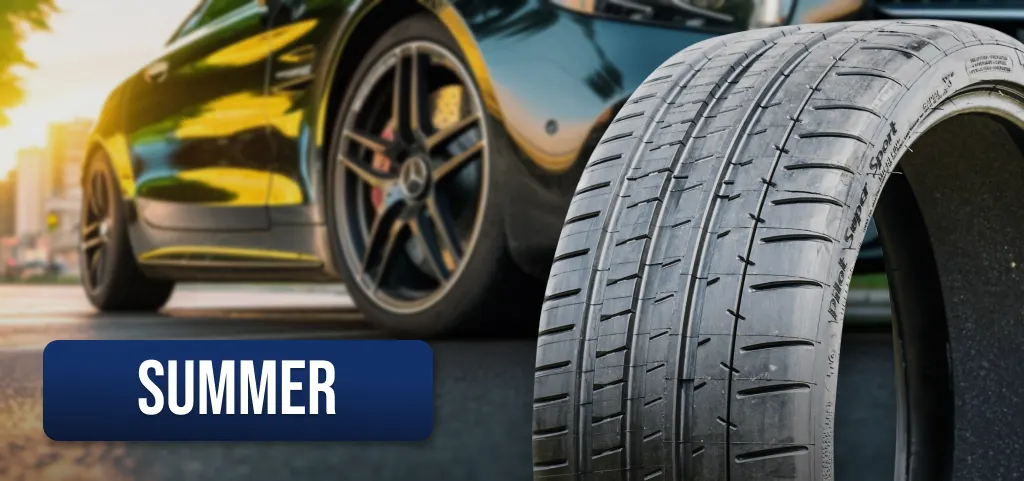
They’re made from a softer rubber compound than all-season tires, which allows them to provide better traction on hot, dry roads. However, this softer rubber also means they harden up when temperatures drop, making them a more dangerous choice in cold weather. This means that if you choose to use summer tires in an area with cold winters, you should always change your tires when temperatures drop below about 40°F
The main defining characteristics of summer tires are:
- Shallower tread depths to better grip the road
- Softer rubber compounds for better traction and handling
- Great cornering and braking capabilities
- Excellent grip for wet and dry conditions
- Most suited to performance cars
- Work best in temperatures from 44°F up
Benefits of using summer tires
Summer tires offer a lot of benefits for people who enjoy a sportier style of driving. They are often the tire of choice for performance and sports cars. This is because they offer great handling and control, especially at speed, as well as great braking capabilities.
When to use summer tires
Summer tires are designed for use in warm weather conditions and don’t work well when temperatures drop. So in most climates, they’re best suited for use during the spring, summer, and fall months when temperatures are consistently above 44°F. They’re not recommended for use in cold or icy conditions, as the softer rubber compound can become hard, which can reduce traction and cause skidding.
If you use summer tires somewhere that has colder winters, we recommend switching them out for winter tires (or possibly all-season tires) when the temperatures drop below 44°F. This will reduce the risk of accidents and ensure your car handles well on ice or snow.
Top summer tire models
Here are some of our picks for the best summer performance tires on the market today:
Continental ExtremeContact Sport

The Continental ExtremeContact Sport tire gives exceptional handling and performance compared to many other options on the market. This tire stands out for its superior handling and cornering performance and its truly excellent wet traction. It’s also one of the only UHP tires to come with a tread wear warranty of 30,000 miles, making it a great choice for high-performance vehicles.
Michelin Pilot Sport 4S

The Michelin Pilot Sport 4S tire is one of the best tires in its class for both grip and comfort. It performs particularly well on dry roads, giving a smooth, quiet ride. Compared to other summer tires, the Michelin Pilot Sport 4S stands out for its superior handling and braking performance, excellent durability, and long-lasting performance. This makes it a great option for sports car high-performance driving.
Pirelli P Zero
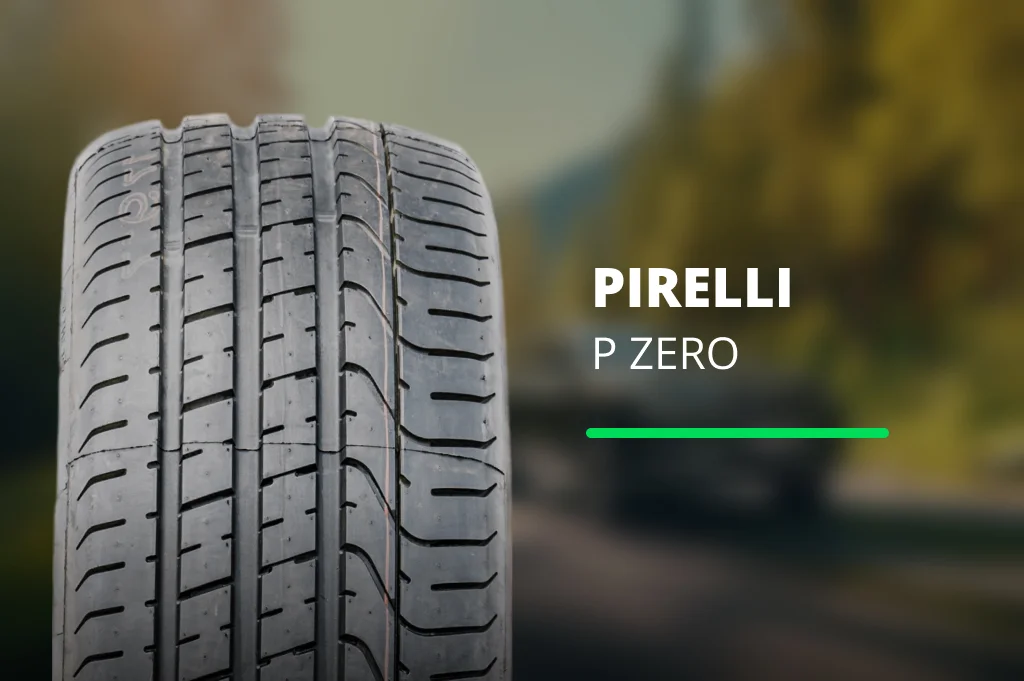
The Pirelli P Zero tire is a top-performing summer tire that offers exceptional handling on wet roads compared to many other options on the market. This tire is designed to provide superior grip and handling in both wet and dry conditions, thanks to its advanced tread pattern and innovative rubber compound. Additionally, the P Zero delivers a remarkably comfortable and smooth ride, making it a great option for high-performance driving.
Don’t let the best tire deals & tips roll by!
Sign up for our newsletter
How to choose the right tires for your vehicle: check-list
When choosing between summer and all-season tires, you should consider several key factors:
- Climate: Think about the climate where you live and the weather conditions you’re likely to encounter throughout the year.
- Driving conditions: What type of driving will you be doing, including highway, city, and off-road driving?
- Driving style: What is your style of driving? Are you fairly conservative and careful on the roads, or do you like a sportier style of driving? Are you likely to be towing or hauling anything with your vehicle?
- Vehicle type: What sort of vehicle do you drive? Is it a sedan, truck, SUV, sports car etc?
- Budget: As well as thinking about the cost of the actual tires, consider any additional costs, such as tire changes and storage.
Once you’ve considered these factors, you can decide which type of tire is best for your driving needs. When buying new tires, it’s important to check your vehicle’s correct size and load rating. And whichever tires you choose, maintain them well so you get optimal performance and longevity.
So is it better to get summer or all-season tires?
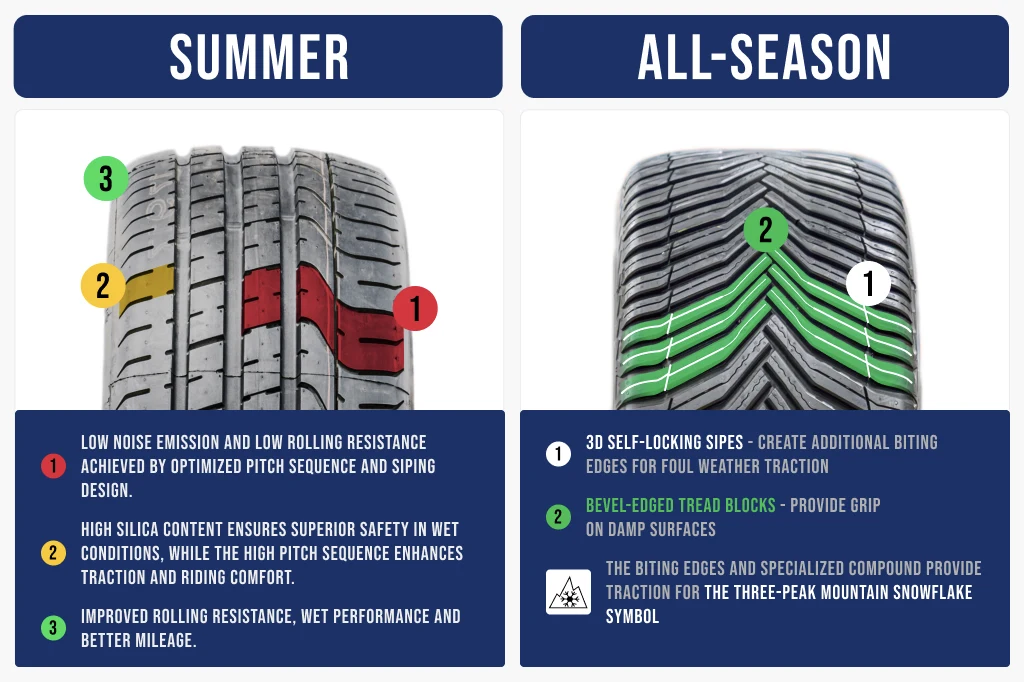
Choosing between summer and all-season tires can seem daunting, but by understanding the differences between these two types of tires and considering your driving needs, you can make an informed decision.
Whether you opt for the improved handling and performance of summer tires or the all-weather reliability of all-season tires, will depend on your driving style and preferences, as well as where you live.
For most drivers who use their cars for commuting or taking their family on road trips, all-season tires will be the most practical use. Unless you live in a place with heavy snow and ice, they can remain on your car all year round, making them the convenient and financially prudent choice.
However, for some motorists, performance is king, and driving is more than just a way of getting from point A to point B. In that case, summer tires might be the right choice for the hotter months of the year, allowing you to enjoy your high-performance vehicles to the maximum.
Frequently Asked Questions
Can I use summer tires all year?
Yes, you can use summer tires all year round if you live somewhere very warm. However, this would not be safe or practical in most parts of the country, as temperatures below 44°F are not recommended for summer tire driving.
Summer tires perform best in warm and hot weather and provide optimal performance and handling in those conditions. When temperatures drop below 44°F, the rubber in summer tires can become hard and less effective, leading to decreased traction and handling on wet or icy roads. This can be dangerous and increase the risk of accidents.
Additionally, using summer tires in colder temperatures can lead to faster wear and tear and reduce the lifespan of the tires. If you live in an area with cold winters, switching to winter or all-season tires is recommended to ensure optimal safety and performance on the road.
Do summer tires wear faster than all-season?
Yes, in general, summer tires wear faster than all-season tires. Summer and all-season tires are made from different rubber compounds and designed for different driving conditions. Summer tires are softer and improve traction and handling on warm, dry roads, while all-season tires are designed for use in a variety of milder weather conditions.
Because summer tires grip the tarmac better, they also wear faster. That being said, the lifespan of a tire can vary depending on several factors, including driving habits, road conditions, and tire maintenance.
Are summer tires worth it?
Yes, summer tires are worth it if you enjoy a sporty style of driving and live in an area with warm weather conditions. They’re specifically designed to provide optimal traction and control in warmer wet and dry weather conditions and can give improved acceleration, braking, and cornering. However, summer tires are not recommended for use in colder temperatures or on wet or icy roads, as they can become hard and less effective.
For the average driver, summer tires may not be worth it, as they will need to be changed when temperatures go below about 44°F. Additionally, a summer tire will often wear out faster than an all-season tire, as it has a shallower tread, which can be a consideration for some drivers.
Do summer tires save gas?
Yes, summer tires can save gas in the right conditions. They are designed to maintain traction and handling on warm, dry roads, which can improve a vehicle’s overall performance and fuel efficiency. The improved handling and stability provided by summer tires can also reduce the need for sudden braking or acceleration, which can save gas by reducing the amount of energy needed to move the vehicle.
It’s important to note that the type of tire alone is not the only factor that affects fuel efficiency. Other factors, such as driving habits, road conditions, and vehicle maintenance, can also play a role in fuel economy. While summer tires may provide some fuel savings in certain conditions, it’s important to consider all factors when evaluating the impact of a particular tire on fuel efficiency.
Are summer tires good on the highway?
Yes, summer tires can be good on the highway, especially in warm, dry weather conditions. They’re specifically designed to provide optimal handling and traction on these types of roads, which can improve the overall driving experience and make for a smoother, more comfortable ride. Summer tires are also typically quieter than all-season tires, which can be a consideration for drivers who spend a lot of time on the highway.
However, it’s important to note that summer tires will not perform as well in cold conditions, and drivers should exercise caution and adjust their driving accordingly in these situations, or ideally, switch their summer for winter tires.
Should I use all-season or winter tires?
If you live in an area with a mild climate, all-season tires are a good choice. However, winter tires or snow tires are a much better option in very cold, snowy, and icy weather. So the answer to whether to use all-season or winter tires depends on your region’s weather conditions and the time of year.
All-season tires are designed to provide good performance in various weather conditions, including light snow and rain, making them a good choice for drivers living in areas with mild winters. Winter tires, on the other hand, are specifically designed for use in harsh winter conditions and provide superior traction and handling on snow and ice, making them a good choice for drivers who live in areas with more extreme winters.


